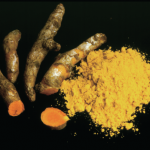What supplements can I take for my arthritis?
A handful of popular supplements are used for arthritis, with varying levels of quality of evidence and effect size. Although the aforementioned ACR guideline conditionally recommends against any supplements, it doesn’t forestall a conversation with patients and will likely leave them (and possibly your curiosity) unsatisfied.
Below I discuss a few supplements you will most likely be asked about, what we know, what we don’t and what you should warn your patients about.
Turmeric
Turmeric is the rhizome of the plant Curcuma longa, which has been used in traditional Chinese medicine for years. Although the terms turmeric and curcumin are often used interchangeably, they are not the same: Only about 1–6% of turmeric is the active ingredient, curcumin or curcuminoids.11
A recently published review evaluated 31 randomized controlled trials (RCTs) on curcumin in various autoimmune conditions and found it may be beneficial in improving disease activity and/or serum inflammatory markers in psoriatic arthritis, ankylosing spondylitis, Behçet’s disease, ulcerative colitis and RA.12 However, only two of these 31 RCTs used turmeric instead of the more potent curcumin or nanocurcumin, which is better absorbed, and doses varied among studies.
Commercially available turmeric and curcumin supplements come in varying doses and formulations. Although the bioavailability of turmeric by itself is actually quite poor, it is improved about 20-fold when combined with black pepper or piperine.11 Unfortunately, many companies have taken advantage of this fact and, in the past decade, case reports of turmeric-induced liver injury have increased. Liver injury has, in part, been attributed to the addition of piperine to these supplements.13
That said, a handful of case reports does not equate to a definite risk for everyone. It is also unclear how much of the hepatotoxicity was from the turmeric, curcumin, synthetic curcuminoids (another popular additive), other contaminants or a combination of all of these and the piperine. In fact, none of the RCTs included in the systematic review noted significant adverse hepatotoxic effects.12 Nevertheless, for patients who already have elevated liver enzymes or are on other medications that may have hepatotoxic risks, providers should be aware of this potential side effect for turmeric and piperine combinations and counsel appropriately.
Additionally, turmeric has been shown to inhibit platelet aggregation, so although the clinical significance of this is unclear, patients taking other anticoagulation agents should be warned of potential interaction or increased bleeding risk.14


